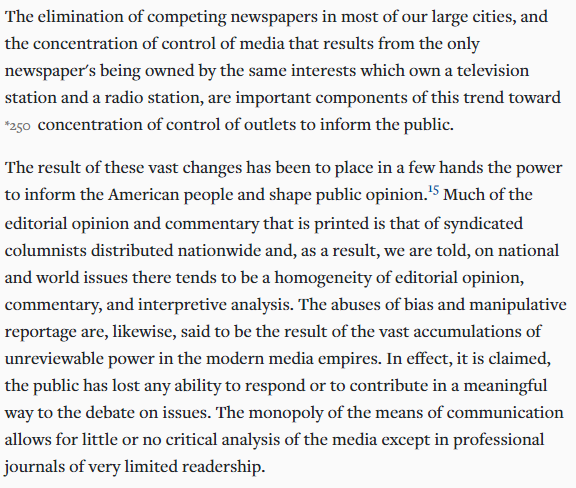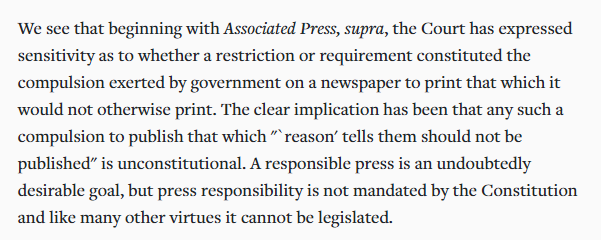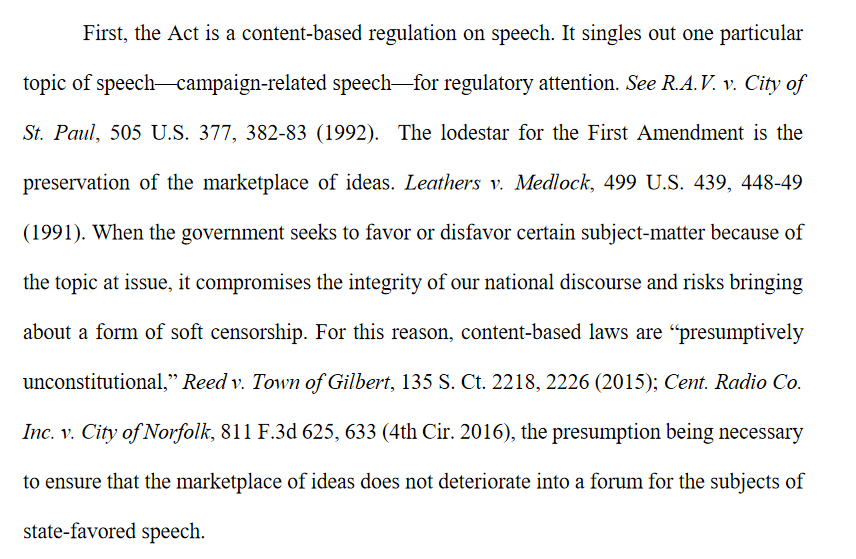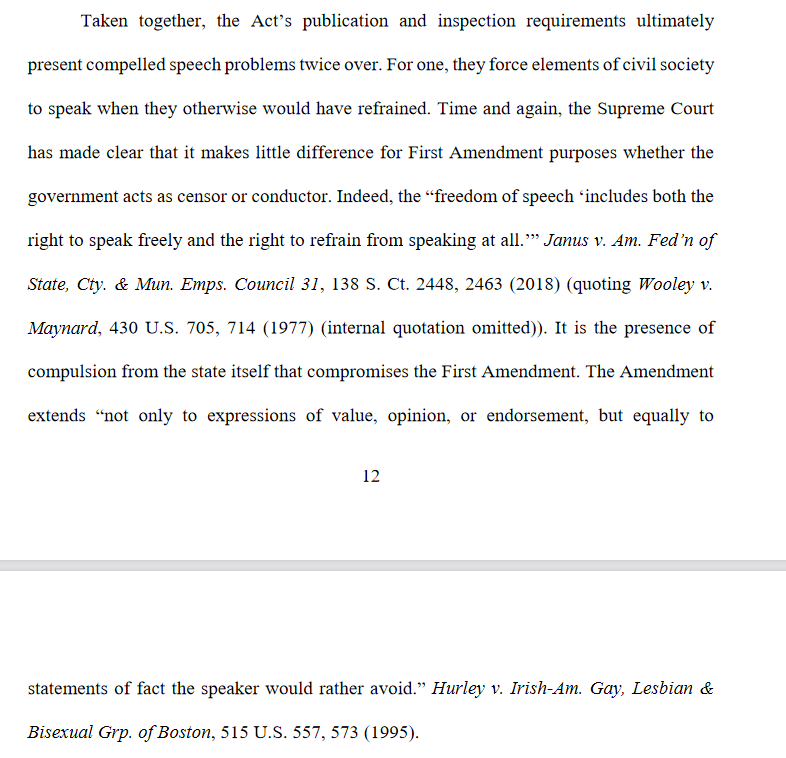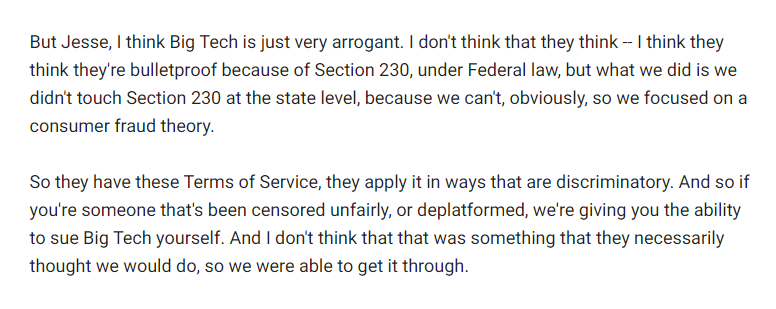1/ On Friday the Florida legislature passed the @GovRonDeSantis-backed Transparency in Technology Act, attempting to regulate how social media sites moderate content. DeSantis has 15 days to sign the bill, and is expected to. Here& #39;s why he shouldn& #39;t. https://www.tallahassee.com/story/opinion/2021/04/30/florida-gov-ron-desantis-social-media-bill-unconstitutional-unwise/4886871001/">https://www.tallahassee.com/story/opi...
2/ The bill would, in part, force platforms to carry the speech of candidates for office, publish detailed content moderation policies, and moderate content "consistently."
That& #39;s going to violate the First Amendment. Ironic, for a bill that& #39;s supposedly about free speech.
That& #39;s going to violate the First Amendment. Ironic, for a bill that& #39;s supposedly about free speech.
3/ Florida has tried this once before, with newspapers. In 1974, the Supreme Court struck down a Florida law requiring newspapers to publish responses from candidates who had been criticized in their publication. https://casetext.com/case/miami-herald-publishing-co-v-tornillo">https://casetext.com/case/miam...
4/ Florida claimed that because newspapers were owned largely by a small and powerful group, the law was necessary to protect the public& #39;s ability to meaningfully participate in debate without abusive bias by powerful interests with control over the means of communication.
5/ If that sounds familiar, it should: it& #39;s exactly the argument being advanced to support legislation regulating social media content moderation.
6/ But the argument was unavailing for Florida then, and it is unavailing now. The Supreme Court held that whatever the *normative* merits of that justification, the government cannot compel private parties to publish speech that they don& #39;t wish to.
7/ That principle applies equally to social media. Platforms, like newspapers, have a First Amendment right to make editorial decisions about what may be published—or who may publish—using their platform, whether or not they do it "consistently." The decision is theirs to make.
8/ Related: in 2019, a unanimous 4th Circuit panel upheld an injunction prohibiting Maryland from enforcing a law regulating political adverts in media.
Like this bill, that law singled out campaign-based speech for special treatment, and required media to publish disclosures.
Like this bill, that law singled out campaign-based speech for special treatment, and required media to publish disclosures.
9/ The 4th Circuit opinion called the Maryland bill a "compendium of traditional First Amendment infirmities," eviscerating it for being a content-based regulation and compelling speech: https://www.ca4.uscourts.gov/opinions/191132.P.pdf">https://www.ca4.uscourts.gov/opinions/...
10/ The panel& #39;s opinion also keenly noted that this type of regulation likely ends with less speech, not more. Beyond not carrying political ads (as Twitter has decided), platforms could just give politicians the boot in general.
11/ This bill will certainly meet the same end. The First Amendment does not permit the government to tell media what they must say, or allow others to say on their platform. Those decisions are left to society to debate, and market forces to decide—not for the law to impose.
12/ The constitutional smackdown this bill faces is not going to be helped by the last-minute amendment from Ray Rodrigues exempting services run by owners of a theme park (read: Disney). You really didn& #39;t need to flush twice to get your strict scrutiny argument down the toilet.
13/ Even if the bill wasn& #39;t unconstitutional, it would still be preempted by #Section230, which expressly prohibits any state-level liability that is inconsistent with 230& #39;s protection:
14/ Section 230 prohibits imposing liability on websites for content moderation decisions, including the exercise of traditional editorial functions, which is exactly what this bill tries to do.
#p330">https://casetext.com/case/zeran-v-america-online #p330">https://casetext.com/case/zera...
#p330">https://casetext.com/case/zeran-v-america-online #p330">https://casetext.com/case/zera...
15/ The Florida legislature acknowledges as much in the bill& #39;s text, which is either an explicit admission that the bill is purely performative, or a weak-as-hell attempt at a savings clause. Might as well have written "this bill may not be enforced."
16/ DeSantis and his allies seem to think that by shrouding the bill in the language of "consumer protection," they can get around the problem. Here& #39;s what he told Jesse Watters:
17/ But no matter how much lipstick you put on this pig, it still purports to impose liability for platforms& #39; decisions to take down content or ban users. It doesn& #39;t matter what you call it; that& #39;s what it is and it& #39;s unquestionably preempted.
18/ And there& #39;s no question that this is the point of the bill. DeSantis himself gave up the game when he called it "the most ambitious reforms yet proposed for combating political censorship and deplatforming.”
This is precisely the type of state law that #Section230 forbids.
This is precisely the type of state law that #Section230 forbids.
19/ And If they didn& #39;t think you were going to do this, it& #39;s only because the "consumer protection" diversion is so incoherent that no court could ever be reasonably expected to fall for. It& #39;s the legislative equivalent of "I& #39;m not touching you," but somehow even less successful.

 Read on Twitter
Read on Twitter